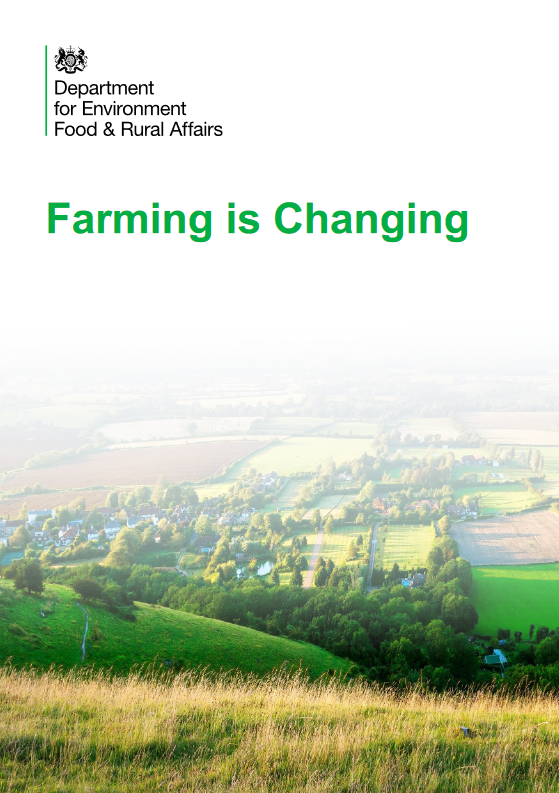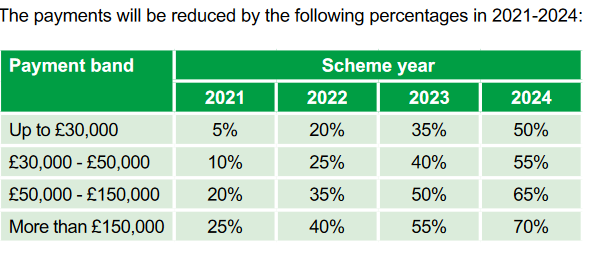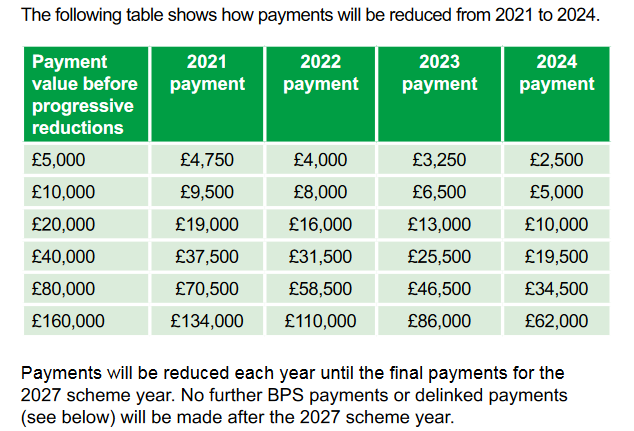
Nobody really has a clue what’s happening to farming over the next few years, and that obviously includes DEFRA.
This document, according to ministers, represents the most fundamental shift in farming policy for over 50 years (but the details are so unclear it would be difficult to write them on the side of a barn, bus or bucket). Despite this policy applying to c70% of England it gets little more than vague coverage by the media, probably because it gets little more than vague coverage by DEFRA.
Yesterday’s announcement was nothing more than a reannouncement of what we were told over two years ago (and frequently since) that the basis for public financial support for English farming is shifting from the Byzantine complexity of the Common Agricultural Policy (with its mixture of subsidy and voluntary environmental schemes) to a completely different system of less subsidy and different environmental schemes.
The fact is, that since we don’t know what the Brexit deal is (and obviously there is plenty of time, plenty of time, to work that out (ie there are days left)), we can’t be very sure about our go-it-alone future.
Imagine you are a farmer (some of you are) then read this document and start planning for the great new future..? How?
Well, you can see how your Basic Payment Scheme money is going to go – literally go. Whatever you are getting now, you won’t get any of it in 2028. Your payments will fall as follows, this table shows the first four years of reductions in bands (which you can think of in terms of being like income tax bands, where the top bits of your income get taxed at a higher rate than the lower bits) as follows:

If DEFRA had carried this table on to 2028, the figure in all rows of the right hand column would be 100% – all gone. What it means for your total payments, adding up the impacts across bands is:

This represents a massive change in the status quo and is completely in line with Conservative policy of free competition and a small state. It is dogmatically pure; the State will no longer (in 2028) subsidise the industry of farming .
Instead, your money will be rechannelled into environmental grants to deliver public goods. This is where everything gets a bit hazy as the details of those schemes are being worked on so, as a farmer, you can see how your subsidies will disappear but not so easily how you get any of that money back through environmental grants.
And environmental grants are for doing things – planting trees, having loads of carbon in your soil, reducing flood risk etc (those public goods) and doing things costs money. What we know about the basis for the grants is that they will be based on an ‘income-foregone’ principle, such that you get paid for the farm income you are foregoing by producing environmental good things.
From the farmers’ points of view, income foregone means that to ‘get back’ the subsidy you have lost, you have to lose some more farming income and you get paid for that lost income. How that works, and how you will game the system, will depend on how accommodating the details of the scheme will be and we don’t know that yet.
From the taxpayers’ points of view, our money will go into farming in a new way that should deliver great environmental benefits, but how that works, and how farmers will game the system, will depend on how rigorous the details of the scheme will be and we don’t know that yet.
So the future of farming is unclear. This is a massive experiment – you can’t say that it is anything else. Will farmers flock to the new environmental scheme or not? And those who do, will their actions produce great environmental gains, or not?
Neither the industry that is being reformed, nor the taxpayer paying for the reform, will have a clue what will happen and so much depends on the details. DEFRA hasn’t had much of a stab at the vision thing in this document and nor has it come up with the details.
As a farmer, you don’t know the basis on which your products will be traded in future and you don’t know the basis on which food will be imported in future. You do know that the hand-outs to which you have become so accustomed over decades are disappearing but you don’t know much about the environmental schemes that are coming in. We talk of uncertain times but, for farmers in England, these are very uncertain times.
The taxpayer isn’t, it seems, getting any of our money back (eg to spend on nurses’ pay) and we don’t know what environmental outcomes are going to be produced instead.
We leave the Transition Period on 31 December but farming will be in transition for years. In a decade things will be very different in ways that are unclear right now. No wonder the view on the cover is all a bit hazy… (and particularly the further up the hill you go).
[registration_form]
What a mess up. While being in the EU had definite problems one can’t help thinking that leaving it, is presenting and will present this country with far worse problems. Far better to have remained in the EU and worked to improve it from within. Now it looks like we are all going to be far more worse off in the future.
Johnson lead this country out of the EU. He has sown the wind now let him reap the whirlwind.
Alan – well, David Cameron probably sowed the wind, and we, the electorate, voted for it (not me!) so we’re all in it together. Up to our necks, it seems.
Nor me. We are certainly up to our necks, my concern is if we sink below the surface!!
I completely agree with you Mark. And that’s not something that happens too often! My concern is that the best opportunity for many years to reform farming to deliver more wildlife will be lost.
Philip – well, let us celebrate our agreement!
Presumably one likely outcome is that many of the smaller and less intensive (and often less profitable) farms will fail. Some currently only survive because of the subsidy. These might be farms that tend to support more wildlife. In the lowlands will they get swallowed up and incorporated into larger, more intensive farms, continuing an existing trend, especially with dairy? A trend towards a more American style of farming? If so then you can see why govt has been keen not to rule out lowering welfare standards.
Ian – that must be possible. Although the larger holdings will no longer get larger subsidies – as they will get no subsidies so the emphasis will be on being able to make money from farming. And that may in some areas mean more intensification, but in others lower inputs and therefore deintensification? I can’t tell – can anyone?
And land prices should drop with the removal of that subsidy income.
It is widely assumed that land prices will drop following the phasing out of direct payments, I’m not so sure they will. The market across much of the country is so heavily inflated by investors and lifestyle buyers. It’s hard to see how ELMs would put these buyers off?
I feel the biggest risk to farming is as much the supermarkets as amounts of subsidies. In my mind small organic farms need to be supported. And maybe a farming coop to stop supermarkets from dictating food prices and the dismantling of large commercial profit driven farms that work will supermarkets to put small farms out of business.
I had the rather mundane task of producing a briefing note on this yesterday. I reduced the 68 pages of the main Defra doc down to 5 and their was virtually no detail even then – merely a series of aspirational headpoints with timelines. Three main things struck me though.
Firstly this does have the possibility to effect real change for the better but due to an almost complete lack of detail we just can’t tell yet, so let’s not get too curmudgeonly too early!
Secondly, the introduction of the “Sustainable Farming Initiative” (one of the 3 main proposals) looks to me like it could be a replacement for BPS and cross-compliance if we are not careful. Replacing one lot of money for old rope with another. Definitely one to watch.
Thirdly, Defra seem to be acutely aware of the issue of sheep farming in the uplands. The Lump Sum Exit scheme to “bribe” farmers to leave farming is clearly in my view aimed here. Also, there is an explicit recognition of the desire to create “wilder landscapes” and their will be a specific funding stream that will be administered by AONBs and NPs “to support farmers, particularly upland farmers to make improvements to the natural environment, cultural heritage and public access on their land.”
Finally – still no detail about regulation.
“The Lump Sum Exit scheme to “bribe” farmers to leave farming is clearly in my view aimed here”
To a degree, but surely the biggest target for the ‘lump sum exit scheme’ are the semi-retired tenant farmers on full ag tenancies? I think of many examples, particularly in the grassland sector, where tenants have practically retired and use the BPS payments towards subsidising the rent, with the land sub-let to neighbours for maize and grass keep. I think this was an unintended consequence of SPS/BPS and has had the impact of stifling fresh entrants into the farming industry.
Yes you could well be right.
That a significant number of small farms would “go to the wall” – the words used – was anticipated in 2017 under Gove. The move to the new support regime continued, therefore it is Gubmint policy.
If I understand it correctly – many farms expect to get the New Dosh but that will be dependent on compliance with all farming regulations existing and future and if they don’t they won’t and if they don’t get the Dosh their infrastructure won’t be brought up to standard so they may well take the FOAD Dosh and let some insane person lose all their money by investing in the farm instead.
Some small farms are so heavily subsidised that it would be more accurate to say they farm subsidies using animals or crops, rather than the other way around. Subsidies, or whatever these new grants are, should go to farms that are within arm’s reach of profitability. There are far too many farms that are basically hobby farms only without the basic honesty of admitting they are hobby farms.
Ian,
I think you are absolutely correct about this. I simply cannot see the current trend of consolidation within the dairy and arable sectors not accelerating rapidly over the forthcoming decades.
However, I don’t feel this will necessarily result in a lowering of welfare or environmental standards, nor necessarily an increase in intensification.
I’m impressed by Alex Thomson on Channel 4 News. He really seems happy to get his wellies muddy explaining environmental issues and did a good interview with James Rebank yesterday. Not that they were able to extract any more certainty from the policy.
Whilst it is lacking detail it feels to me that this has the potential to be something very good. No doubt the farming lobby will be doing everything in their power to water it down, so I feel it is now up to the conservation organisations, environmentalists etc. to do their very best to shape this in to something that could have far reaching and long lasting benefits to the countryside.
There’s no point waiting for Defra. They don’t know – they just don’t have the expertise. If conservation sits there waiting for someone to decide they will – and the decision will be led by the conservative (NFU) end of intensive farming. Conservation needs to stop whingeing about everything that is going wrong (a full time job, I accept) and get out there and pitch a clear vision of how we need to see the farmed countryside – and there are lots of models, from environmental farmers, the incredible re-wilding of Knepp, Phillip Merrick’s conservation achievements, and in the uplands RSPB Geltsdale surely provides a model of what could be achieved. Forget the farmers saying it can’t be done – there is only one game in town, and that is the bottom line – farm income is everything, and farmers deliver, and deliver cheaper than the competition. It is incredible how quickly farming – and the countryside generally – can adapt once given a clear lead. Conservation must now give that lead.
Farming is already up to its neck in debt having increased agricultural borrowing from 360 million a few years ago to over 20 billion now. The industry is bankrupt and the loss of over almost 4 billion in subsidy can only mean one thing. The demise of the industry and back to the thirties with land left empty, hedges never cut everything left to nature, which i suppose helps the environmentalist!!
M – thank you for your first comment here.
Well, good to hear from you M Moore. Loath as I am to let the facts get in the way of your rhetoric, let’s have a go.
1 – The average (mean) level of liabilities (debt) across farms is £234,400 per farm.
2 – The average net worth across all farms is £1.82 million per farm.
3 – The average gearing ratio across all farms is 11%.
4 – The average liquidity ratio is 222% and there has been no overall upward or downward trend since 2009/10.
Please can you explain your statements in the light of these facts?
Cool, works for me.
Because I don’t trust Eusless I can’t help but think this is just a money saving exercise. I hope to be proved wrong but…
I agree with you too Rod. And thank you for your comment re our conservation management. However our model at Elmley and on Romney Marsh is different to that of most conservation NGOs in that we have chosen to manage our NNRs on an entirely pragmatic basis. Which is different to most reserves managed by NGOs who are mindful of the animal rights element of their membership who, whilst they might be a small proportion, can make a lot of impact on social media over the issue of predator control and other issues. Fencing out and at the same time lethally and legally controlling ground feeding predators such as foxes has enabled us to fledge the largest numbers of chicks of the ground nesting Lapwing on any site in lowland UK. And for the same reason last January, we hosted around a quarter of the UK’s Marsh Harriers in our reedbeds. So it appears that a decision will need to be made between outcome focussed pragmatic conservation management and that of membership organisations which are driven by a worry of what is said on social media sites. Not an easy choice for NGOs re ground nesting birds.
No one sadly want’s farming.
No countryside
Govt food security a joke.
Import everything.
Reform will squash even middle sized farm’s into extinction.
As with everything corporations will take over, food standards will drop.
UK or USA just two different locations, same just on different scales.
They call this progress.
Soon will have two thirds population with serious illness, due to poor food and sedentary lifestyle.
Philip. ‘ Pragmatic conservation ‘. I like that. Now that’s something Farmers can be rewarded for within an ‘environmental scheme ‘. Your results do not surprise me. Conducted within the law, immediately before and during the nesting / fledging period gives red and amber listed birds such as the Lapwing their best chance of reproducing and extending their range again. Rewinding and /or habitat management alone will hardly ever -if at all – achieve the goal of saving these birds South of Derbyshire !!. Outcomes easily measured year on year , verified and ‘kerching kerching’. Everyone’s a winner and the public have something to see.